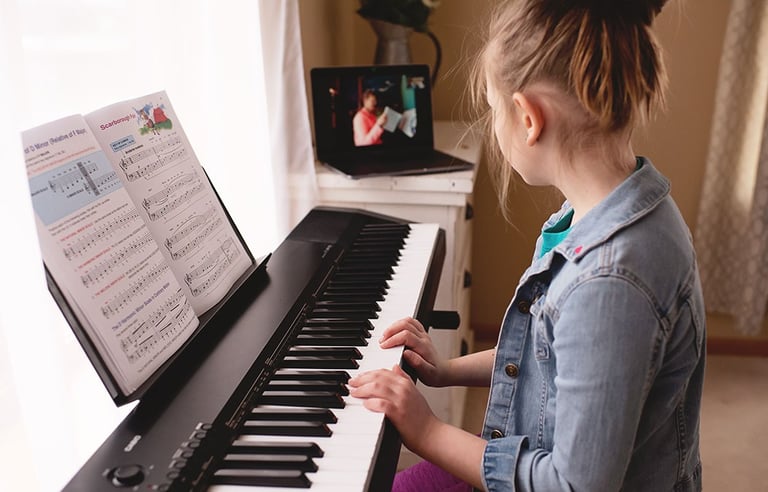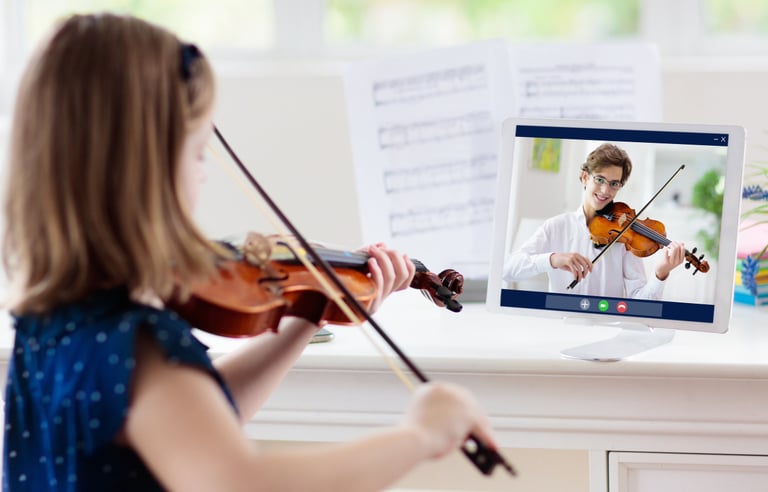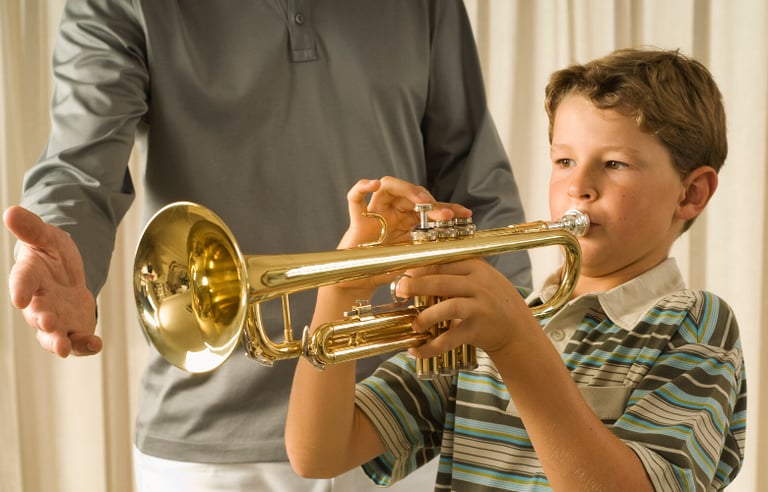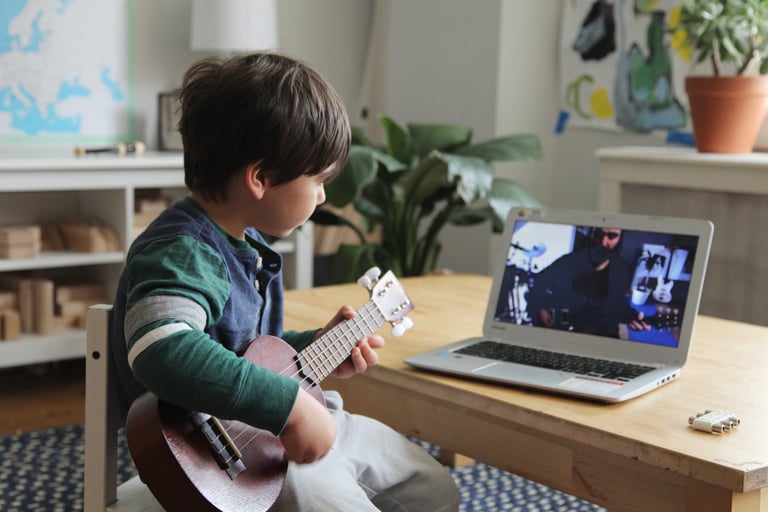Online vs Offline Music Lessons: Which Is Right For You?
Struggling to choose between online and in-person music lessons? This blog explores the benefits and challenges of both formats, from flexibility and accessibility to hands-on guidance and real-time feedback. Whether you prefer the convenience of virtual learning or the immersive experience of face-to-face instruction, this guide will help you decide which approach best suits your musical journey.
MUSIC EDUCATION


Music education has evolved dramatically in recent years, especially with the rise of online learning. Aspiring musicians today have more options than ever when it comes to choosing between online and offline music lessons. While both formats have their own strengths, the ideal choice depends on your learning style, goals, and lifestyle. In this blog, we'll explore the pros and cons of each approach and help you decide which might be the best fit for you.


Online vs Offline Music Lessons: Which Is Right For You?
The Rise of Online Music Lessons
Online music lessons have become increasingly popular, thanks to advancements in technology and the accessibility of high-speed internet. According to a 2022 report by IBISWorld, online education in general has grown by over 8% annually in the last five years, with music lessons being a significant part of that expansion. This growth has been fuelled by convenience, flexibility, and a wide range of available instructors.
Benefits of Online Music Lessons
Flexibility & Convenience – One of the biggest advantages of online music lessons is the ability to learn from anywhere. Whether you're a working professional, a student, or a parent juggling multiple responsibilities, online lessons eliminate the need for travel, making them a time-efficient option.
Access to Expert Instructors – Online learning allows students to study with teachers from all over the world. This means you can find an instructor who specialises in your preferred genre, instrument, or teaching style without being limited by geography.
Recorded Sessions & Digital Resources – Many online music teachers provide recorded lessons, sheet music, and practice materials that students can access anytime. This is especially beneficial for reviewing difficult concepts or practicing at your own pace.
Comfort & Personalised Environment – Learning from home can create a more relaxed atmosphere, reducing the pressure some students feel in a formal setting. This can be particularly useful for beginners or those prone to performance anxiety.
Challenges of Online Music Lessons
Technical Issues – Poor internet connection, audio lag, or background noise can sometimes disrupt lessons, making it harder to focus or hear nuances in sound quality.
Lack of Physical Guidance – Some aspects of playing an instrument, such as hand positioning and posture, are more challenging to correct online. Teachers can provide verbal or visual instructions, but they cannot physically adjust a student's technique as they would in person.
Self-Motivation Required – Online students often need to be more self-disciplined and proactive in their practice, as there is no physical presence of a teacher to keep them accountable in the same way as in a traditional setting.




The Traditional Appeal of Offline Music Lessons
Despite the rapid growth of online learning, traditional in-person music lessons remain a preferred choice for many students. There is something irreplaceable about the face-to-face interaction between teacher and student, particularly in a subject as tactile and expressive as music.
Benefits of Offline Music Lessons
Hands-On Guidance & Immediate Feedback – In-person lessons allow teachers to make real-time corrections to a student's posture, hand positioning, and technique. This can accelerate learning and prevent bad habits from forming.
Stronger Teacher-Student Connection – Many students feel more engaged and motivated in a physical classroom setting, where body language, facial expressions, and personal interaction create a dynamic learning experience.
Better Sound Quality – In an offline setting, students and teachers can hear the full depth and nuance of sound without the limitations of audio compression or connectivity issues.
Opportunities for Group Interaction & Performance – Offline lessons often provide opportunities to participate in group classes, ensemble playing, or recitals, which help develop musicality, collaboration, and performance confidence.
Time & Travel Commitment – One of the biggest drawbacks of in-person lessons is the time spent commuting to and from classes, which may not be feasible for those with busy schedules or limited transportation options.
Limited Teacher Options – Depending on where you live, finding a teacher who specialises in your instrument or genre of interest may be difficult. This can limit the scope of your learning experience compared to the diverse pool of online instructors.
Higher Costs – Offline lessons tend to be more expensive due to studio rental fees and travel expenses. While online lessons can also be costly, they often provide more budget-friendly options with teachers from different locations.
Challenges of Offline Music Lessons
Which One is Right for You?
Ultimately, the decision between online and offline music lessons depends on your personal preferences, learning style, and goals. Here are a few guiding questions to help you decide:
Do you thrive in a structured, interactive environment where you can receive hands-on guidance? → Offline lessons may be best for you.
Do you need flexibility in your schedule and prefer learning from the comfort of your home? → Online lessons might be a better fit.
Are you looking for access to a wider range of instructors, particularly in specialized music styles? → Online lessons provide more options.
Do you value in-person performance opportunities and group interactions? → Offline lessons offer more engagement.
For some students, a hybrid approach—combining online lessons with occasional in-person check-ins—can provide the best of both worlds.
Final Thoughts
Both online and offline music lessons have their own unique advantages and challenges. With the increasing availability of high-quality online platforms and tools, online music education has become a strong contender, but traditional lessons continue to offer benefits that technology cannot fully replicate. The key is to choose a format that aligns with your needs, lifestyle, and musical aspirations.
Whatever path you choose, consistency, dedication, and passion will be the true determinants of your musical growth. Happy learning!




Share this on:
About The Author


Padmavathy Divakaran is a distinguished pianist, arranger, and music educator, currently serving as the Director of Aum Piano Studio. Formerly the representative for MTB Exams in Tamil Nadu and Karnataka - a globally recognised music education board based in the UK - she has consistently championed excellence in music education. Padmavathy holds a BA (Honours) in Music from Middlesex University, London, and a Diploma in Higher Education – Music from KM College of Music and Technology, Chennai. Her outstanding talent has been recognised through multiple scholarships and awards, including those presented by Dr. A.R. Rahman. As a performer, she has showcased her versatility across classical and contemporary genres, playing with orchestras in both London and Chennai. She was a core member of the Roliwood Seaboard Ensemble, playing a key role in the global launch of the ROLI Seaboard. Her artistry has earned her the honour of performing at prestigious events, including a special performance for Prince William, Simon Cowell, and other notable personalities at The Founders Forum in the UK — a testament to her global reach and artistic impact.